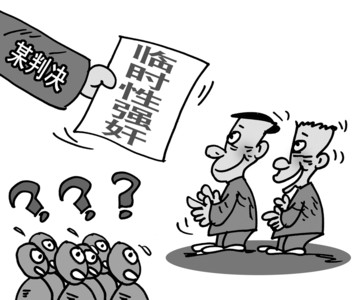
In June of 2009, a young woman was out celebrating her college acceptance with two police officers she apparently knew. They proceeded to get her drunk, take her to a hotel, and then they took turns raping her. On October 27, they were sentenced. It is at this point that the series of events takes an interesting turn – the judge decided to sentence them each to only three years as he viewed their crime as “temporary” – there was no evidence of premeditation and all parties involved were ‘appropriately’ apologetic. A lawyer from Zhejiang Hai Hao Law Firm explained that under normal circumstances, when two or more people rape another, it is generally referred to as gang rape, and that under existing law “they should have been sentenced to more than a decade in prison, life imprisonment or death, which has a significant difference from their three-year term.”
Understandably, this grotesque judgment has unleashed a fury of criticisms. The outcry has been so loud that even the paragon of global feminism and progressive politics, the Wall Street Journal, took notice.
It would be accurate to situate this whole series of events within the rot of corruption that plagues nearly every system where the law and the enforcement of that law are part of the same apparatus. It would be equally accurate to attribute this to misogyny, another case where the woman was “asking for it” and thus convinced the helpless men to commit a crime. But what if there is more to the story? As pointed out by Marta Cooper at Global Voices Online, it is about society.
As one commenter has added to the discourse, “We will soon be living in a temporary time.” Presumably, this means a time where all crimes that lack premeditated malice are temporary. What if it is actually this woman, and others, who are judged to be “temporary” and not the crime itself?
If this is the case, the era of temporality is no so much looming over us but rather we are already there. This woman was not yet a productive member of society. She had yet to find herself in full-time employment, that climax of meaning and value ascribed by capitalist logic. Even worse, she was not yet a part of the reproductive labor force. There is an assumption that she is only at the beginning of her own long march toward modernity.
It is in this context of value, that the Wall Street Journal’s attention comes back into focus. Why would the bourgeoisie who leaf through its pages care about rape, let alone the rape of an anonymous woman in China? The story is more than just a retelling of a method of masculine disciplining of the woman at the heart of this story. At the periphery are the dagongmei.
The same logic which constructs temporary rape is similar to the processing of dagongmei bodies where they migrate to the factories so that they might migrate into a more culturally desired representation of their femininity. For all the ways that gender is used as a tool of discipline for these woman (and the woman) the masculinized domination receives a far lesser sentence, which is useful knowledge when much of the economy has been made in China.
Labor, of either the physical or intellectual variety, has been constructed as temporary so as to deskill and devalue the efforts. Being-temporary means being-replaceable. On this scale, there is a necessary regulation of identities to ensure enough of a cold conformity that there is little difference between the models. To vary from this regulation is to be unproductive. And unproductivity is the greatest sin under this contemporary logic of capitalism.
As far as this particular brand of logic is concerned, these little sisters have no real identity of their own prior to being inserted into the factory process where they (re)make themselves into something that has concrete use value in place of what was before only the potential for it. This something is the simulacrum of femininity that Kristeva articulates in her observations on female sexuality. The value of a woman’s body is her potential to (re)produce the commodities of desire.
As far as this logic of capitalism is concerned, what is the value of a woman’s body to the system? In “The Arcane of Reproduction” Leopoldina Fortunati identifies that there are really only to possibilities which have been made ‘natural,’ and hence invisible, by this system which has largely reduced human interactions into questions of exchange and value – housework and prostitution. This creates two worlds of gender, one where there is a partner who sells their labor to capital while the other partner sells their labor to the reproduction of social norms adhered to by the State (and the reproduction of the State itself) is one the causes of the compulsory heterosexuality within the structures of the nuclear family (pg 24).
Is this the source of the self-fulfilling prophecy that is being-temporary? Have our collective bodies and identities become so regulated, commodified, and instrumentalized that there is no alternative to other that to be temporary until the time that we become domestic?
Then again, it really could just be corruption and misogyny.
I don’t know but I must admit that the outcry gives me hope. Even if it is only temporary.
(Image Credit: China Digital Space)